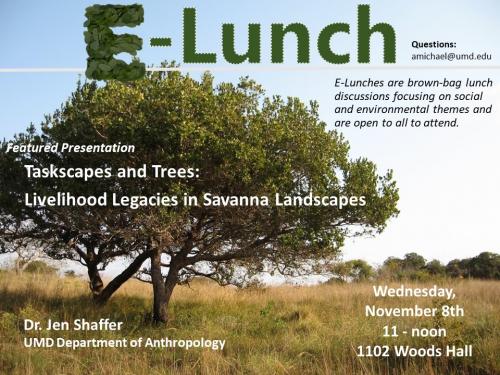E-Lunches
E-Lunches – Discussions highlighting ecological and environmental anthropology and related topics
Join students and faculty in the Department of Anthropology for our monthly E-Lunch series! E-Lunches are informal brown bag lunch discussions, featuring different topics and presenters each month that focus on ecological and environmental themes. The intent of the series is to foster a relaxed discussion space to share current work, solicit feedback, and promote communication and collaboration within and outside of anthropology. E-Lunches are open to all to attend and typically take place on Wednesdays from 11 to noon in 1102 Woods Hall (click here for the full schedule).
Until further notice, E-Lunches will not be available via webinar for the 2017-2018 school year.
If you have any E-Lunch related questions, please contact Adriane Michaelis (amichael [at] umd [dot] edu ()).
Upcoming E-Lunch: November 8th
Please join us Wednesday, November 8th to hear from Dr. Jen Shaffer (UMD Dept. of Anthropology) as she shares her work on plant diversity, local plant use, and livelihood practices in southern Mozambique.
(See below for full abstract.)
TASKSCAPES AND TREES: LIVELIHOOD LEGACIES IN SAVANNA LANDSCAPES
Dr. Jen Shaffer
University of Maryland, Department of Anthropology
Plants define southern African ecosystems and contribute significantly to the ecosystem services that humans and other species depend upon, including provisioning of food and water, climate regulation, support for nutrient cycles, and cultural benefits. Although national parks, reserves, and transfrontier conservation areas offer protection to many plant species throughout Mozambique, anthropogenic pressures ranging from overexploitation and agricultural expansion to habitat modification and climate change threaten the loss of these key organisms and their contributions to ecosystem processes. The coastal forest-savanna mosaic of Matutuine District in southern Mozambique is a biodiversity center of international interest. District rural residents use the high diversity of wild plants in this landscape for household needs and have developed a range of management practices to ensure sustainable access for members of their communities. Ongoing changes to regional conservation policy place increasing pressure on reducing local access and use of wild plant resources in Matutuine District, yet culturally based livelihood practices may be key to the support and maintenance of plant diversity and ecosystem services in the region. This research project investigates relationships between plant diversity, local plant preferences, and livelihood activities in Matutuine District.



